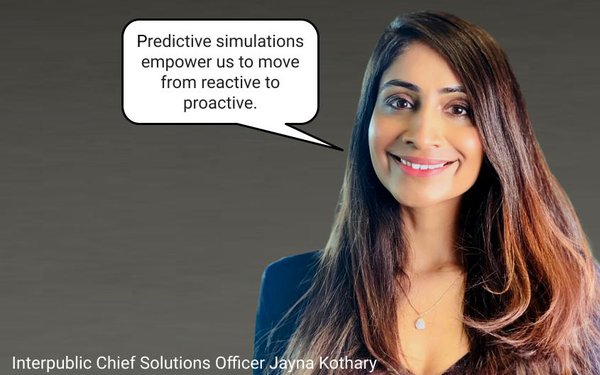
Interpublic this morning unveiled
plans for what it calls a "simulation studio" powered by new "agents-based" research capable of simulating human responses to any scenario -- including ad campaigns -- with a speed and accuracy
unimaginable by human-based research methods.
The studio -- which is based on technology, software and research methods developed by AI startup Aaru -- is not exclusive to the holding company,
but Interpublic has a first-mover advantage, including some exclusive benefits like input on new features and product design, as well as the integration of proprietary consumer data from Interpublic's
Acxiom unit.
Interpublic is calling the deal a "first-of-its-kind" for the ad industry and comes ahead of its merger with Omnicom -- which is expected to close soon -- and ultimately, its
integration into Omnicom's own, impressive AI-powered tech stack.
advertisement
advertisement
The deal with Aaru includes immediate access and integration with three established products capable of simulating human
responses in private sector, political and public sector decision-making (see descriptions below), as well as the development of new, custom versions focusing explicitly on the needs of advertising,
marketing and media for Interpublic and its clients.
"Aaru creates whole world simulations using agents that mirror humans beyond simple demographics, including character traits, likes and
dislikes, behavioral and social habits, relationship status and more," an Interpublic spokesperson said in response to a MediaPost query about the underlying methodology.
Importantly, Aaru's
technology is capable of scaling the number of simulated agents based on the project at hand, from small focus group-like settings to large scale panels projectable to segments of the population based
on any geography.
"Any population, audience, or geography on the globe -- form five agents to 100,000 agents or more," the spokesperson continued, adding: "We can create any audience you can
imagine -- from people who spend $30,000 a year on handbags to a new parent in a rural market with diabetes -- and uncover insights based on their aggregate reactions to our queries for any
strategies, platforms, media, and campaigns we want to test."
"Humans don’t scale. They don’t tell the truth, they have biases, and they frequently don’t respond. Worst of
all, they’re slow," reads some of the descriptive boilerplate copy on Aaru's website, which also touts its ability to "reduce four weeks of research into 40 seconds with higher accuracy than any
survey, poll or focus group in 1,000th the time."
The use of AI agents simulating human respondents is not new, and most if not all of the world's leading consumer researchers are exploring or
already implementing the use of so-called "synthetic respondents" trained on and simulating the characteristics and likely behaviors of human respondents, which have historically been slow, expensive
and unreliable to research with pinpoint accuracy.
Just think of the increasing unreliability of political polling in recent years, as well as newer human-based methods such as prediction
markets data in accurately predicting political campaign outcomes.
Aaru's collateral copy features other compelling claims and taglines, including "We tackle questions on the scale of
humanity," "We build clarity in chaos," and "Welcome to the new age of decision dominance."
“This partnership represents a paradigm shift in how we approach marketing, capitalizing on
the opportunity that AI brings for scale, speed, and precision,” Interpublic Chief Solutions Officer Jayna Kothary, Chief Solutions Officer said in a statement, adding that the holding company
is particularly excited about the opportunity to couple Aaru's agents with Acxiom's data.
Aaru's product descriptions:
- Lumen -- the private
sector, "reach the unreachable" -- simulating audiences representing: C-suite executives, corporate rulings/situations, federal organizations, unique customer segments, true target markets,
instantaneous product innovation, hyper-targeted marketing.
- Dynamo -- the political sector, "recreates the world using the same principles that govern reality"
-- simulating humanity from the ground up by factoring in hundreds of demographic traits, psychographic profiles, and cognitive drivers.
- Seraph -- the
public sector, "dynamic, operational landscapes" -- simulating environments that are entirely configurable to any time, media environment or location, "craft messages that hit harder than any
weapon."